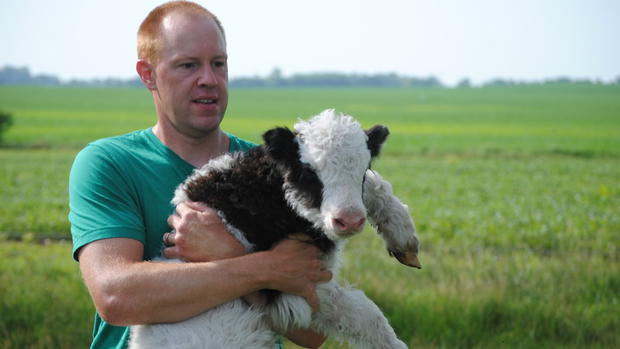RAYMOND—If you’re craving a fresh yak steak and can’t make the trip to the Everest Steak House Restaurant in Kathmandu, Nepal, take a short ride over to Raymond.
That’s where you’ll find the Hot Disch Farm, home to Shawn and Craig Dischinger and their assistants, sons Jack, age 5, and Peter, age 3. They’ll happily sell you ground yak, or yak roasts, steaks, brats and sticks.
Their yaks thrive on the lush grasses of the Minnesota prairie, where the harshest of winter winds bother them not, according to Craig Dischinger.
“I like to be different. I like the uniqueness of the animal,” said Craig to explain how he began raising yaks on this farmsite outside of Raymond. Shawn had only to taste her first bite of yak steak to be sold on the idea, he said.
The lean, flavorful meat has the texture of beef. It is considered one of the healthiest of red meats. It’s low in fat and unhealthy cholesterol, but high in protein and also omega-3.
Craig and Shawn come from farm backgrounds. They had been raising beef cattle on a small scale. “We realized we needed to get bigger or specialize,” Craig said of the decision to quit raising beef.
They looked at opportunities ranging from bison to water buffalo before deciding on yaks. They wanted something unique that would get them into a niché market to sustain a small farm, he explained.
They currently graze 21 yaks, four of them boarded for others, on just over nine acres of pasture.
The animals are native to the Himalayas, where they provide meat, milk for cheese and butter, and serve as pack animals.
“I haven’t milked one,” Craig said with a pause before adding: “yet.”
They sell their yak meat over the internet, and on Saturday mornings at the Farmer’s Market in Willmar. They also make visits to fitness centers like the crossfit gym in Little Canada. Their customers prize the meat for its healthy qualities and flavor, he explained.
Along with the quality of the meat, the Dischingers chose yaks for their hardiness. Their bills at the veterinarian are one-third of what they were with beef cattle, he said. The grass-fed yaks can grow to 1,500 to 1,700 pounds, but it takes several years.
These are domestic yaks, but there is more wild in them than with beef cattle, as the Dischingers discovered with the very first yaks they acquired. “I was good at jumping a 4-foot fence,” said Craig, laughing.
Today, they cull the herd by making sure the ornery among them are the first to make their way to the “white box” or freezer in their mobile trailer.
The meat is USDA certified and processed at Carlson Meats in Grove City. They also have the hide tanned for leather and they comb the hair for fiber.
They sell everything from the skull with horns to the bones (for dogs). A specialty shoemaker in Wisconsin is testing the leather for its possible use in footwear.
They’ve sold a set of tails to a couple in San Francisco, Calif., for a Tibetan wedding. A woman purchased a full hide for the wall of her cabin near International Falls.
As specialty farmers, the Dischingers prefer to market their meat directly to the customer. They rely on their “Hot Disch Farm” Facebook page, where they post videos and, in tongue-in-cheek fashion, allow “Gertrude” the yak to write some of the narrative.
Craig jokes that he loves to “yak about yaks,” and it’s important that he does. A lack of familiarity with the animals by customers is their main challenge in marketing, he explained.
They have been raising yaks on the farm for nine years, and are building repeat customers while steadily introducing new ones to the meat. Prices range from $10 pound for ground up meat to $25 for the choicest cuts of steak.
Customers can be passionate. One paid the roundtrip airfare for Craig to personally deliver 150 pounds of yak steaks to his Florida home last March. Craig said he almost didn’t make it through airport security. The security guards teasingly threatened to confiscate one of the coolers for their own grills.
Shawn is a physician’s assistant with the Family Practice Clinic in Willmar. Craig had been an industrial arts instructor with the ACGC school district for 10 years. He took last year off from teaching, but will be returning to the classroom this year with a new school.
All of their yaks are registered with the International Yak Association. The Dischingers believe they are among only seven yak producers in Minnesota. Nationwide, they believe
there are no more than about 200 yak farms, with about 50 selling yak meat. There are a few producers raising yaks in Montana and Colorado on as many as 200 to 300 acres, said Craig.
He said they don’t anticipate taking up such a large piece of the landscape in western Minnesota corn country for yaks, but long-term they’d like to slowly continue to expand the herd and acreage.
West Central Tribune by Tom Cherveny

